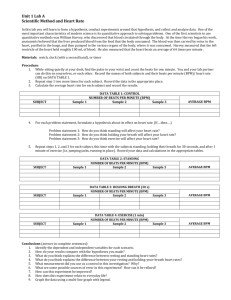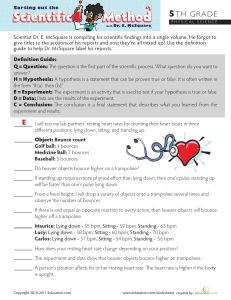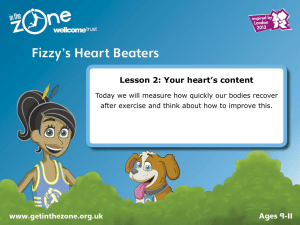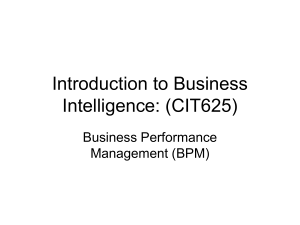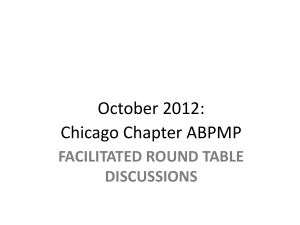Heart Rate Lab
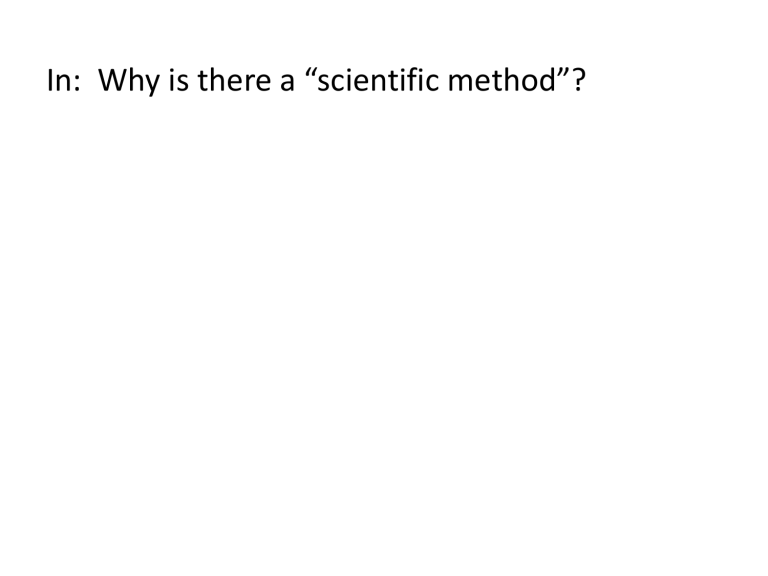
In: Why is there a “scientific method”?
Learning goals : Students understand and use the scientific method to do an experiment.
Success Criteria: Students know the steps of the scientific method, and can write a proper scientific conclusion.
Area of Interaction: Human Ingenuity
MYP Unit Question: How can the scientific method be applied to problems that are not scientific?
• Ask a Question
• Do Background Research
• Construct a Hypothesis
• Test Your Hypothesis by Doing an Experiment
• Analyze Your Data and Draw a Conclusion
• Communicate Your Results
Heart Rate Lab
Heart Rate Lab
Problem: How does exercise affect heart rate?
Heart Rate Lab
Problem: How does exercise affect heart rate?
Background:
Heart Rate Lab
Problem: How does exercise affect heart rate?
Background:
Hypothesis:
Heart Rate Lab
Problem: How does exercise affect heart rate?
Background:
Hypothesis:
Materials:
Procedure:
1. Determine heart rate while sitting.
2. Determine heart rate while standing
3. Walk in place for 1 minute and find heart rate
4. Jog in place for 1 minute and find heart rate.
5. Run in place for 30 seconds and find heart rate.
6. Record all data.
Data:
Activity
Sitting (BMR)
Standing
Walking
Jogging
Running
Graph your data …
Heart Rate (BPM)
Data Analysis:
• What is your graph showing?
• Is there anything that doesn’t really fit?
Explain.
Conclusion: The purpose of this lab was to determine the effects of exercise on heart rate. We did this by doing a series of activities that affected heart rate, including sitting, standing, walking, jogging, and running.
Conclusion: The purpose of this lab was to determine the effects of exercise on heart rate .
We did this by doing a series of activities that affected heart rate, including sitting, standing, walking, jogging, and running.
The data showed that the heart rate increased with increasing exercise, going from 66 bpm for walking up to 106 bpm for running, so the data did support the hypothesis.
Conclusion: The purpose of this lab was to determine the effects of exercise on heart rate. We did this by doing a series of activities that affected heart rate, including sitting, standing, walking, jogging, and running. The data showed that the heart rate increased with increasing exercise, going from 66 bpm for walking up to 106 bpm for running, so the data did support the hypothesis . An explanation of the data is that as exercise increases, more oxygen is needed by the muscles for cellular respiration to produce more energy, so the heart must beat faster to supply the O2 to the muscles.
Conclusion: The purpose of this lab was to determine the effects of exercise on heart rate. The data showed that the heart rate increased with increasing exercise, going from
66 bpm for walking up to 106 bpm for running, so the data did support the hypothesis. An explanation of the data is that as exercise increases, more oxygen is needed by the muscles for cellular respiration to produce more energy, so the heart must beat faster to supply the O2 to the muscles . Some errors may have occurred during the lab.
Since heart rate was taken by counting for 15 seconds, and multiplying by 4, there is an error of +/- 4 bpm built in to the procedure.
Miss-counting could also have been a factor, causing the heart rate to be higher or lower by a few beats, but not affecting the overall results of the experiment.
Since heart rate was taken by counting for 15 seconds, and multiplying by 4, there is an error of +/- 4 bpm built in to the procedure.
Miss-counting could also have been a factor, causing the heart rate to be higher or lower by a few beats, but not affecting the overall results of the experiment. This lab could have been improved by using heart rate monitors to get an exact count of beats, and by doing several trials of each activity to find an average heart rate for each activity.
Other questions that I have relative to this lab are: how does activity affect blood pressure?
How does an athlete’s heart rate compare to an average person’s heart rate? What is the affect of age on heart rate?
• Other questions that I have relative to this lab are: how does activity affect blood pressure?
How does an athlete’s heart rate compare to an average person’s heart rate? What is the affect of age on heart rate? This related to today’s objectives by showing how to use the scientific method and how to write a conclusion.
Out: What is the scientific method? Don’t make a list, just tell me what it is.
